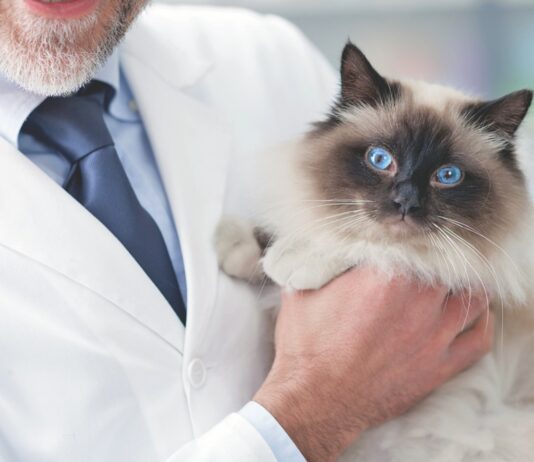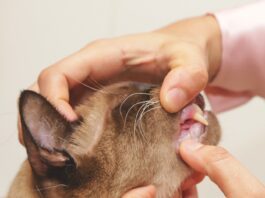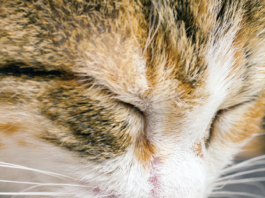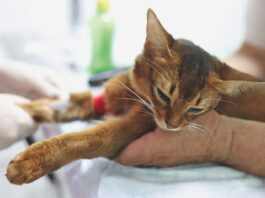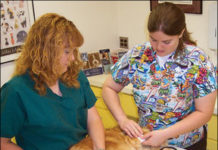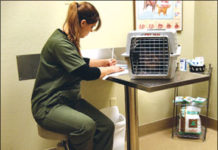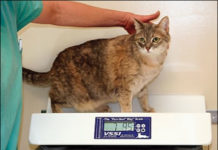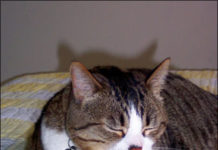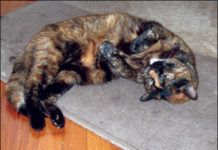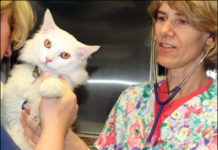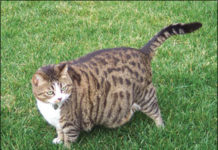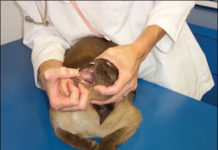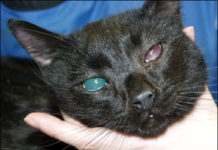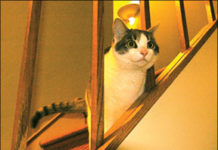Cats and High Blood Pressure
As cats reach the age of eight or nine (the rough equivalent of 40 or 50 in a human), they may begin to show signs of age-related physical disorders that may or may not increase in severity as the animals continue their transition into old age. Some feline geriatric conditions, of course, may ultimately prove fatal. Others, however, may be amenable to medical therapy that can extend the life of an elderly cat for several years. Hypertension (abnormally high blood pressure) is one of the latter disorders. If untreated, it can lead to blindness and possible damage to the heart, kidneys and brain. But given an accurate assessment of its cause and prompt initiation of appropriate veterinary treatment, the condition is most often manageable, says Richard Goldstein, DVM, an associate professor of small animal medicine at Cornell Universitys College of Veterinary Medicine who is board-certified by both the American and European Colleges of Veterinary Internal Medicine. Feline hypertension, he notes, "occurs far more frequently than people think."
Short Takes: 04/08
Its one of the toughest choices a pet owner can face - between life-saving treatment and quality of life for the pet. During chemotherapy for lymphoma, the third most common form of cancer in cats, for example, the patient might lose hair, appetite, weight, sleep or even its whiskers. Some help in deciding, if the difficult time ever comes, can be found in a Journal of Feline Medicine and Surgery (Vol. 10, Issue 1) report: "Owners perception of their cats quality of life during chemotherapy for lymphoma." Of the 31 cat owners queried for the study, 25 (81 percent) said they were happy that they had treated their cat with chemotherapy, whereas three felt regretful and three were unsure of their feelings. Most of the owners (19) reported that their cats had "more good days than bad" during chemo; seven reported more bad days than good (including one cat that was miserable every day of the treatment); and four cats had "all good days." Despite the treatment, some cats did die of lymphoma or related causes. Obviously those owners were not happy with their pets eventual fate, but few regretted trying their best to save a life.
Testing for FIV and FeLV
Among all causes of lethal feline disease, none should be taken more seriously by cat owners than those caused by two specific submicroscopic organisms: feline leukemia virus (FeLV) and feline immunodeficiency virus (FIV). Although these viruses are somewhat different in appearance and in the manner in which they exact their toll on feline health, infection with either one of them, if undetected, is capable of causing a cats premature death. To make matters worse, FeLV and FIV infections are by no means rare. Recent estimates indicate that two percent to four percent of the 83 million or so cats in the U.S. harbor one or both of these two viruses.
Pyometra: A Deadly Threat
Humane considerations overwhelmingly support the practice of spaying — the surgical removal of a female cat’s ovaries and uterus — when an animal is about six months of age. Perhaps the most compelling argument in favor of this procedure (also known as ovariohysterectomy) is the reduction of feline overpopulation. One study has found that 85 percent of cats that are dropped off at shelters are eventually destroyed. It is estimated that as many as three to four million unwanted cats and kittens are put to sleep annually in the U.S.
Caring for the Cat With Chronic Illness
Would you be able to provide at-home care for your cat? Heres what to consider.
The Danger of Hairballs
Every so often, your otherwise fastidious cat will do an alarming and somewhat disgusting thing. Shell awake from a peaceful nap, rise up on her paws, retch convulsively for a moment or two, and spit up what may appear at first glance to be a damp clump. What the animal has disgorged in the middle of your kitchen floor or, worse yet, in the middle of your prized Persian rug is a trichobezoar, a wad of undigested hair that is commonly referred to as a hairball. Despite the term, disgorged hairballs are not usually round. They are often slender and cylindrical, shaped more like a cigar or sausage than a ball. According to Richard Goldstein, DVM, an associate professor of small animal medicine at Cornell Universitys College of Veterinary Medicine, a spit-up hairballs elongated shape is imparted by the narrow food tube (esophagus) in which it develops or through which it passes on its journey from the cats stomach to the outside world. However, he notes, a hairball that is not disgorged and remains in the stomach will indeed be round "like a sponge or a rolled-up sock," he says.
The Cat in Heat
The yowls of a cat in heat are unmistakable. When a female cat needs to mate, you should expect incessant crying, strange posturing and constant attempts to escape outdoors to waiting males. The best thing you can do about your cat in heat is to prevent it from happening in the first place. Its a smart idea to have her neutered before her first heat cycle. However, sometimes thats not possible. So if youve never experienced a cat going into heat, heres what you should know. The fertile period of your cats reproductive cycle is called estrus, more commonly referred to as "being in heat." Sexual maturity starts when a female (the queen) is quite young - about six months old. In some cases, it can be as young as four months. Early estrus can often catch uninformed human companions by surprise when they find out their kitten is having kittens. "Shorthair cats typically come into heat sooner than longhair cats," says Jane E. Brunt, DVM, of The Cat Hospital at Towson in Baltimore, MD. And indoor cats may come into heat a little later.
Lung Disease: A Serious Threat
Like their human counterparts, feline lungs are bag-shaped, elastic organs, two in number, located on either side of the heart and occupying most of the space in the chest cavity. They are virtually identical in structure to human lungs as well, functioning in the same manner and fulfilling the same fundamental purposes - removing carbon dioxide from the bloodstream and keeping the blood constantly supplied with life-sustaining oxygen. The lungs perform their vital functions by means of two processes - ventilation and perfusion - explains Richard Goldstein, DVM, an associate professor of small animal medicine at Cornell Universitys College of Veterinary Medicine.
What Is Cushing’s Disease?
Your cat Pinky has enjoyed good health for most of the eight years shes spent in your home. Lately, however, shes been undergoing some worrisome changes. Shes eating and drinking much more than she used to; shes recently begun to develop a potbelly; and shes become uncharacteristically lethargic. While such changes could be attributable at least in part to her advancing age, they are also signs that Pinky could be afflicted with a disorder called hyperadrenocorticism, otherwise known as Cushings disease. According to Deb Zoran, DVM, PhD, an associate professor of medicine at Texas A&M Universitys College of Veterinary Medicine and Biological Sciences, this condition is extremely rare in cats - far less frequently diagnosed than it is in dogs. Nevertheless, cat owners should be aware of Cushings disease, its causes, the clinical signs associated with it and the treatment options available.
Ask Elizabeth: 03/08
Dear Elizabeth, I am an elderly cat owner. Im old and so is my girl, Pearl. Over the years, we have gotten used to many changes in visits to our veterinarian. For example, Pearls "yearly shot" is no longer annual, and screening lab work is an expected part of her exam. These changes have been explained to me and I accept them, but there is one thing I just cant get used to. Years ago our vet would take a few minutes on the exam table to clean Pearls teeth. Pearl didnt like it much, but the vet was able to take care of her teeth without anesthesia right in the office. Now, that office procedure just isnt offered; instead our vet is recommending anesthesia for dental cleaning. Pearl has visible tartar on her teeth, but why cant my vet just clean them in the exam room?
Diagnosis: Cataracts
Cats eyes, like those of humans and many other animals, are complex arrangements of delicate structural components that operate harmoniously in a normal, healthy animal to enable keen vision. Unfortunately, things sometimes go wrong with one or more of these components as a result of disease, aging, traumatic injury or genetically acquired defects. Cataracts can seriously impair a cats vision and even cause blindness. Compared to the frequency of its occurrence in humans and dogs, this ocular disorder is rarely seen in cats, says Thomas Kern, DVM, associate professor of ophthalmology at Cornell Universitys College of Veterinary Medicine. Nevertheless, all cat owners should know the physical and behavioral signs of this disorder and the special needs of a visually impaired feline.
Short Takes: 03/08
If statistics help you make difficult decisions, there are plenty of numbers in a Journal of the American Veterinary Medical Association (Vol. 231, No. 1) article, "Determining the optimal age for gonadectomy of dogs and cats." First the researchers compared benefits and risks of the surgeries. For example, spayed female cats incur an immediate 2.6 percent risk of surgical complications, [IMGCAP(1)]as well as a high risk of obesity, and less than a one percent risk of either FLUTD (feline lower urinary tract disease) or diabetes mellitus - all later in life. None of spayings possible outcomes causes what the researchers termed "substantial morbidity." That is, surgical complications from the spaying (called ovariohysterectomy or OHE) are hardly ever life-threatening.

